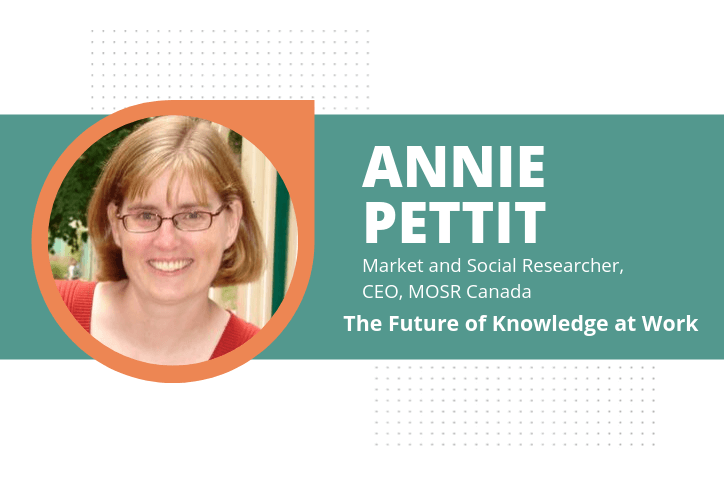Bloomfire Q&A: Annie Pettit on Clear Communication, Open Source Knowledge, and Getting Better Data from Questionnaires

Whether you’re a market researcher or a knowledge management professional, you’ve probably learned that the best way to get valuable information is to start by asking the right questions. For this entry in our Future of Knowledge at Work series, we talked to someone who has spent a lot of time thinking about how to ask questions that encourage meaningful, genuine answers.
Annie Pettit is an experienced market research advisor and wordsmith who specializes in designing questionnaires and communicating research results in plain language. We’ll let Annie take it from here.
Tell us a little about yourself.
My TL;DR is that I’m a market researcher who loves to write. I collected a few degrees in psychology with a specialization in the data quality of online questionnaires. The transition into marketing research made perfect sense! I held roles in questionnaire design and analysis, data quality, access panel analytics, sampling, and social media listening. Along the way, I became interested in standards and ethics, and now serve as the Canadian Chair of ISO 20252. I became a fellow of the Canadian national marketing research association in 2016.
How did you get started in your career as a freelance market researcher?
I was unexpectedly laid off in 2016. I decided to take six months off to brush up on my ukulele technique, learn about new research tools, and enjoy a bit of quiet time. However, I started getting calls from people who wanted me to help them with projects. Before the six months was up, I had a full roster of consulting clients and decided to stick with it. The commute and vacation time were huge benefits!
What knowledge do you rely on most to do your job?
Other than having a fairly proficient knowledge of grammar and when to use capital letters, staying current with what’s happening in the research, marketing, and technology space is key for me.
I trained as a specialist in online questionnaires but let’s be honest— questionnaires can’t solve every problem and they’re slowly evolving into new types of tools. However, the theory of questionnaires is relevant in everything I do.
Every researcher needs to know how to formulate clear and concise questions that anyone can understand, regardless of their education and language skills.
And just as we transitioned questionnaires from paper to telephone to online, we continue to transition them to chatbots, voice assistants, and virtual reality. Clear communication in every channel is essential.
In your experience consulting on and running beginning-to-end research projects, what do you think are the biggest knowledge management challenges (and how do you solve them)?
It often feels like people are building seemingly new theories and ways of working that are actually decades-old, established ideas. Behavioral economics and cognitive biases have decades of knowledge tucked away under the heading of psychology. Data science is a cool new way of talking about correlation, regression, factor analysis, and other basic statistics.
People get excited about the new labels and don’t realize they can access a wealth of existing information if they simply knew the old label for it.
In general, we’re learning and moving forward, but we need a better way to connect new entrants in our industry with the existing knowledge base. I think some of that is simply ensuring that people trained in programming and statistics also get training in the social sciences, and vice versa. It’s no longer sufficient to just understand statistics or just understand human behavior.
Thoughts on how new technologies will impact the way researchers manage and share their results?
So many new technologies are being developed to do this, but I think right now a lot of them are internal. Global companies are hiring consultants to design and implement new systems to more easily and quickly share their own research findings across all of their global locations. It will be excellent when those companies are able to share their non-proprietary findings externally using open source tools.
Academics are starting to reject pay-per-view and pay-per-publication journals in favor of sharing the knowledge they’ve discovered more broadly. Private industry will soon get on board.
Can you tell us a little about your book, People Aren’t Robots?
I’ve done a lot of troubleshooting bad questionnaire data over the years and I keep seeing the same mistakes happen over and over again. Part of the problem is that a lot of people come into the questionnaire design space with little to no background in writing questionnaires. With just a little bit of guidance, they could be generating far better data quality and far better consumer insights. I designed the book as a very practical guide that is quick and easy to read. Plus it has a couple of my favorite recipes at the end. As all marketing research books ought to!
Do you have any words of wisdom you’d like to offer to someone just getting started in a market research career?
My best piece of advice is to make the first move yourself.
Don’t sit on the sidelines and wait for someone to personally invite you to do something.
When you get a hint that help is needed in some regard, volunteer to write that blog post, lead that project, join the committee, speak at that conference, comment on that association think piece. And once you’ve done one of those things, be the mentor who encourages your colleague and helps her take the leap the next time. As Nike says, and I’ll expand on… Don’t wait to be asked. Just do it!
Thanks for sharing your thoughts with us, Dr. Pettit!
And for those of you who enjoyed this interview, check out the previous entries in our Future of Knowledge at Work Series:
Jeff Miller on Promoting Change and Distributing Knowledge to Workers in the Field
Steve Portigal on Reusable Research, Interview War Stories, and Letting Go of Implicit Beliefs

How to Build an Insights Engine: The People, Technology, and Culture You Need

How to Measure the ROI of Knowledge Management

How to Navigate the Chain of Command in Business to Get Executive Buy-in

Start working smarter with Bloomfire
See how Bloomfire helps companies find information, create insights, and maximize value of their most important knowledge.

Take a self guided Tour
See Bloomfire in action across several potential configurations. Imagine the potential of your team when they stop searching and start finding critical knowledge.